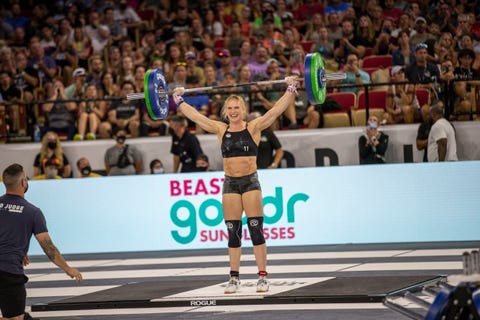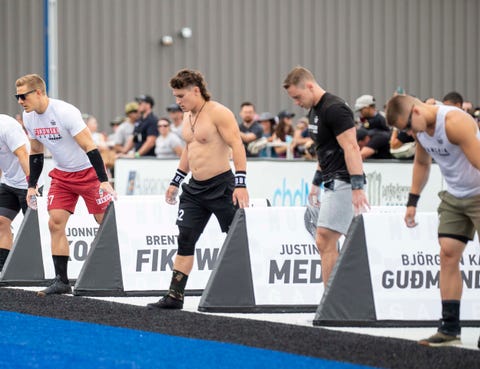The 2021 CrossFit Games was a contest that featured both a widely-predicted landslide victory and a tense battle to make claim on a long-held crown. In one division, a favorite becomes the sport’s most dominant in history, and a relative rookie is the new champion in another.
After a two-year hiatus from Madison, Wisconsin, the CrossFit Games did not disappoint. Over five days of competition, which concluded on Sunday, 600 athletes, including teens, teams, masters, individuals, and the inaugural adaptive division, made a strong case for being considered the fittest people on earth.
As promised, the Games were a wide-ranging test of fitness, from a cardio-heavy first event — a mile swim with fins followed by a three-mile kayak paddle — to the “home run derby” of CrossFit, the one-rep max snatch, to more classic chippers, like the four-rounder of rope climbs, ski erg, and sandbag carries.
As is typical, the Games also included a new movement, or rather, a twist on a familiar movement: handstand pushups that, instead of being done against a wall, were freestanding.
After small sets of heavy deadlifts, athletes had to push up into a handstand and walk a few inches forward. Adding more difficulty, they then had to demonstrate control in their descent, a standard that even the event winners, Pat Vellner and Annie Thorisdottir, struggled with despite their backgrounds in gymnastics.

When it came to the winner, though, there was nothing surprising on the women’s side. Before the final two events even took place, Tia-Clair Toomey-Orr had already scored enough point to win her fifth Games, and in the process, she broke the all-time record for event wins, ending the weekend with 33 total and nine in 2021 (out of 15 events). The rest of the podium was predictable. Despite some strong performances by younger athletes, like Haley Adams, it was the veterans who dominated, with Laura Horváth taking second and Annie Thorisdottir in third.

This was Thorisdottir’s 11th Games appearance, but despite her experience (and two previous Fittest on Earth titles), she was unsure whether she’d even compete this year after a traumatic experience giving birth in 2020. Despite this hesitations, she was exceptional, surprising herself (as much as Tia-Clair Toomey-Orr) with a 200-pound snatch.
On the men’s side, the horse race wasn’t certain until the last event. Throughout the weekend, Pat Vellner and Brent Fikowski, both multi-year Games athletes, traded blows with last year’s Rookie of the Year, Justin Medeiros. Ultimately, 22-year-old Medeiros pulled away, winning the final workout (his only event win of the weekend) and becoming the youngest male champion in Games’ history.
Withdrawals and Covid-19 Complications
Sadly, many other athletes didn’t have the opportunity to finish the weekend, even before the scheduled cuts on Saturday.
Before the first day, two athletes tested positive and were medically withdrawn. Another, fan favorite Kara Saunders, tested positive early in the week but was allowed to compete after a negative antigen test on-site. Still, she withdrew on Friday, saying her health “100% comes first.”
And then there were the other withdrawals. Six individual athletes left for non-COVID reasons, including Dani Speegle, who rolled her ankle coming off a rope climb, and seven-times Games athlete Brooke Wells, who dislocated her elbow during the one-rep max snatch.
Looking forward, Toomey-Orr said during a press conference after the Games that she plans to return next year. Considering her continued and unchallenged dominance, she’s almost certain to win barring an injury or an act of God.

The first big question, then, is whether Medeiros is well-positioned for his own reign atop the podium, potentially achieving the same dynastic success as Toomey-Orr now and Mat Fraser before him in the Men’s division. He’s an exceptional athlete for sure, but it’s worth mentioning that Vellner, this year’s silver medalist, had to recover from a weak start. On the first event, the swim and kayak, he finished 35th, a hole from which not even six top-three events finishes could help him recover.
That said, CrossFit is a sport of consistency, and Medeiros was remarkably consistent. Of 15 events, he only finished the top 10 only three times.
The second big question is what next year’s competitive season will look like. Every year, the format has changed, but the new administration seems committed to what’s in place, with the Open in March and then a series of quarterfinals, semifinals, and last-chance qualifiers.
Whatever the schedule may end up being, this weekend’s Games proves that functional fitness is as exciting to watch as it ever has been. Some faces change, some stay the same—but the struggle to crown the world’s fittest will always spur incredible performances.
Source: Read Full Article
